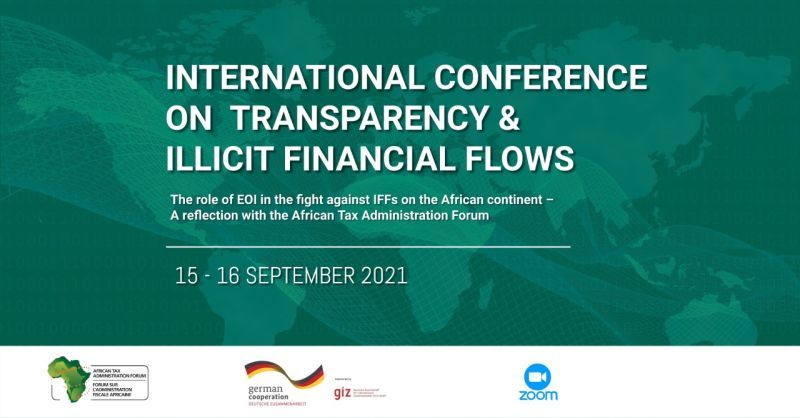OUTCOME STATEMENT: EOI & IFFs Conference calls for political commitment in implementing HLP recommendations

PRETORIA – The ATAF-GIZ Conference on Transparency and Illicit Financial Flows (IFFs) stressed that political commitment is required in the implementation of the recommendations of the High-Level Panel (HLP), which was widely adopted by the AU. Data has shown that commercial IFFs relating to tax are the highest source of IFFs in Africa; thus, there is a need for focus and dedication to addressing the tax issues and shifting the narrative to highlight that IFF is not solely through criminal activities.
The ATAF-GIZ Conference attracted over 500 officials from Ministries of Finance and African Tax Administrations of 42 African Union (AU) member states, Members of Parliament, Regional Economic Communities (RECs), Civil Society, African Capacity Building Foundation, Global Forum on Transparency and Exchange of Information for Tax Purposes, United Nations Economic Commission for Africa (UNECA), Development Partners including NORAD and SECO, other key partners, individual tax policy experts and private sector players.
It took place virtually through Zoom on 15 and 16 September 2021 under the theme The Role of EOI in the fight against IFFs on the African Continent.
The first day of the conference was characterised by discussions about where the continent is on combatting IFFS in the COVID-19 pandemic, the role of exchange of information (EOI) and maximising opportunities under IFF information.
The three speakers in the Opening Session: Mr Logan Wort (Executive Secretary, ATAF), Mr Maurice Ochieng (Programme Head of the Good Financial Governance in Africa Programme) and H.E. Amb. Albert Muchanga (Commissioner: Economic Development, Trade, Industry and Mining at the African Union Commission) highlighted the following critical issues:
- Transparency is the basis under which communication between different countries, agencies and government departments can succeed in combatting IFFs from Africa.
- Customs revenue requires specific attention as an area to curb IFFs.
- The AUC and the Department of Economic Development, Trade, Industry and Mining launched a Multi-Donor Action to add to the existing mechanisms established to curb IFFs for a period of four years.
The conference noted with concern the continuous outflow of IFFs from Africa and the negative impact it has on the lives and livelihood of Africans. It requested all governments to implement recommendations from eminent platforms such as the AU High-Level Panel on IFFs led by H.E. President Thabo Mbeki and others like FACTI.
It singled out the central role tax administrations play in curbing IFFs since 65% of the IFFs are tax-related. To this end, the meeting underscored the need to strengthen tax administrations by providing skills required to be able to detect and dismantle drivers and movers of IFFs. Some progress has been made in terms of adopting policy frameworks like EOI, AEOI, CBCR, beneficial ownership registers etc.
Participants noted that IFFs are cross border in nature and called for closer cooperation of the international community and need to provide resources to African countries to be able to deal with this menace.
The participants stressed that addressing IFFs also requires stakeholders to follow the money. In most cases, the money is only followed to the border of another jurisdiction.
How do we to fast-track implementation of the FACT/HLP recommendations? Day two of the conference put instruments to facilitate exchanges and combat IFFs across the continent into focus.
The conference further highlighted that the utilisation of exchange of information goes beyond audit and investigation to cover the full compliance cycle of the taxpayer, including registration, filing of returns, assessment of income, collection of taxes, risk identification processes and identification of financial crimes. AEOI teams should have systemic interaction with all these areas of the tax operations and be aware of ongoing investigations.
It highlighted that success stories have shown that the successful implementation of AEOI requires due planning with the establishment of an interagency working group tasked with planning and executing AEOI implementation.
One of the panellists, Honourable Irene Ovonji-Odida, said IFFs remain a growing problem despite gains that have been made. “IFFs occur through tax, BEPS, we see it through aid. The global tax system is not inclusive and so the decisions being made will not benefit Africa—This is despite proposals being submitted by various stakeholders including ATAF, the G24, ICRIT etc. There's a whole range of activities. All these different sectors need to be brought together.”
Honourable Ovonji-Odida stressed that major global economies benefit from illicit financial flows and developing counties suffer the most.
The conference stressed that political commitment is required in the implementation of the recommendations of the HLP, which was widely adopted by the AU.
In his closing remarks, Mr Maurice Ochieng – Programme Head: Good Financial Governance at the GIZ said, “This conference has made the importance of EOI. Recommendations of the FACTI Panel report remain crucial to fighting IFFs.”
Participants thanked ATAF and GIZ for organising the conference and further acknowledged the critical role the African Union is playing in ensuring political commitment to combatting IFFs from Africa.
Access and read the full Outcome Statement here.
Téléchargez la Déclaration finale en Français içi.
Descarregue aqui a declaração final em português.










